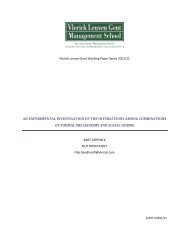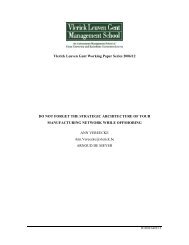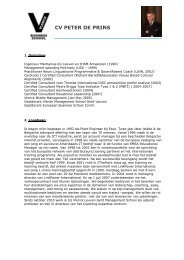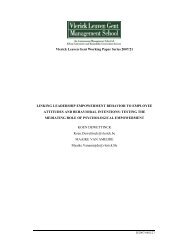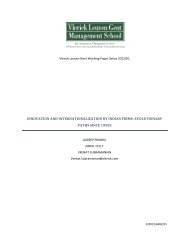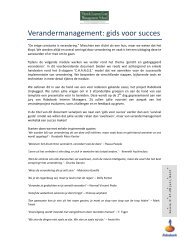Vlerick Leuven Gent Working Paper Series 2007/03 ... - Vlerick Public
Vlerick Leuven Gent Working Paper Series 2007/03 ... - Vlerick Public
Vlerick Leuven Gent Working Paper Series 2007/03 ... - Vlerick Public
Create successful ePaper yourself
Turn your PDF publications into a flip-book with our unique Google optimized e-Paper software.
But up to date, mainstream research has failed to reveal a consistent direct relationship<br />
between board structure and performance outcomes (Coles et.al., 2001; Dalton et.al., 1998).<br />
There seems to be a point of agreement in literature that progress in the field will<br />
largely depend on a better understanding of the inner workings of a board of directors<br />
(Hermalin and Weisbach, 2000; Pettigrew, 1992). Already a small number of empirical<br />
studies offer a worthy attempt to open-up the “black box” of actual board conduct by<br />
exploring the dynamics of power and influence as well as the behaviour of board members<br />
and their relationship with management (Leblanc and Gillies, 2005; Roberts et al., 2005; Huse<br />
and Schoning, 2004; Pettigrew and McNulty, 1995). Parallel, some scholars have attempted to<br />
model the dynamics of boards theoretically (Huse, 2005; Nicholson and Kiel, 2004a;<br />
Sundaramurthy and Lewis, 20<strong>03</strong>; Forbes and Milliken, 1999). This paper links up with this<br />
research stream as such that it is also aimed at getting a more profound insight into the<br />
concept of board effectiveness by omitting a direct relationship between board characteristics<br />
and performance outcomes. Although the accents slightly differ, we share a common belief,<br />
i.e. that board effectiveness is determined by a large and interrelated set of variables which<br />
have been - to a large extent - ignored in mainstream board research.<br />
The purpose of this paper is to investigate - from a conceptual point of view - the<br />
interrelationship between various criteria which are presumed to be important for the<br />
effectiveness of boards. In this respect, we will pay special attention to intangible aspects of<br />
board conduct. Guided by existing board models and complemented with additional literature<br />
from different disciplines, significant variables will be extracted and integrated into a<br />
theoretical framework. This paper unfolds along the following lines. We begin to explain,<br />
more in-depth, the inconclusive results found in board-performance links. Second, we briefly<br />
explain how board of directors differ from other teams 1 in an organization. Understanding the<br />
uniqueness of boards is useful because it limits the extrapolation of constructs found in other<br />
literature, in particular regarding group dynamics. Third, we develop the research framework<br />
and, based on theoretical assumptions, we derive a number of propositions indicating<br />
relationships between the identified variables. We go on with a discussion of the limitations<br />
and boundary conditions of the model. The paper ends with our conclusions.<br />
1 It must be noted that the management literature has tended to use the term “team” while academic literature has<br />
tended to use the word “group”.<br />
5



